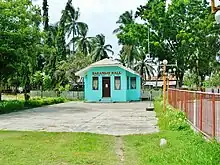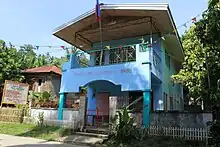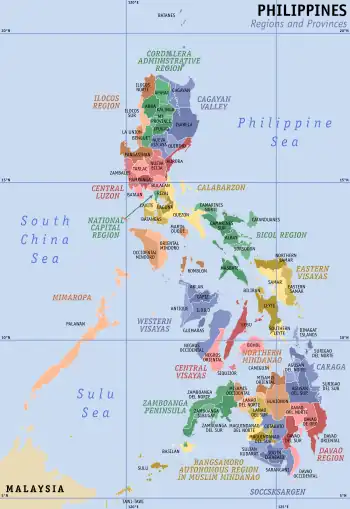
A barangay hall is the seat of government for a barangay, the lowest elected administrative division of the Philippines, below that of a city or municipality. It serves as the office of the barangay captain and meeting place for the Sangguniang Barangay.[1] These officers' names, pictures and responsibilities are usually displayed in the hall.[2] The hall can be considered the counterpart to its municipality's municipal hall.[3]
The barangay hall also serves as a local community center, often providing space for both permanent and temporary services and events. The barangay's day care center and office space for the tanods and the barangay health workers are often located there. Medical missions, religious services, fiestas, and sports contests are often held near or next to the barangay hall.
Gallery
A selection of barangay halls:
 The Barangay Bilogo Multi-purpose Hall, Batangas City
The Barangay Bilogo Multi-purpose Hall, Batangas City Sulop Barangay Hall
Sulop Barangay Hall Tumapon Barangay Hall
Tumapon Barangay Hall Maybo Barangay Hall in Boac, Marinduque
Maybo Barangay Hall in Boac, Marinduque Barangay Hall, Barangay Look 1st, Malolos City Bulacan.
Barangay Hall, Barangay Look 1st, Malolos City Bulacan. The Multipurpose Hall of Barangay Tungay, Santa Barbara, Iloilo
The Multipurpose Hall of Barangay Tungay, Santa Barbara, Iloilo Barangay Hall and Tanod Outpost, Barangay Sto Rosario, City Proper, Iloilo City
Barangay Hall and Tanod Outpost, Barangay Sto Rosario, City Proper, Iloilo City Barangay hall and multi-purpose hall of Barangay Mariana , Quezon City
Barangay hall and multi-purpose hall of Barangay Mariana , Quezon City
See also
References
- ↑ Aruego, José Maminta (1975). Barangay Government Law and Administration. University Book Supply. p. 230. Retrieved June 8, 2022.
- ↑ Carley, Michael; Smith, Harry (November 5, 2013). Urban Development and Civil Society: The Role of Communities in Sustainable Cities. Routledge. p. 106. ISBN 978-1-134-20050-4. Retrieved June 8, 2022.
- ↑ Boquet, Yves (April 19, 2017). The Philippine Archipelago. Springer. p. 427. ISBN 978-3-319-51926-5. Retrieved June 8, 2022.

